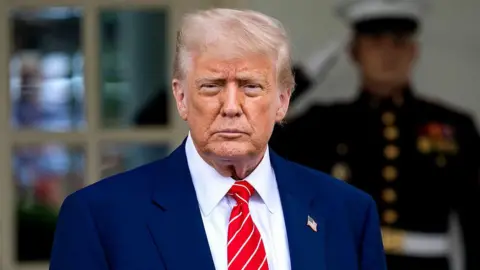In a recent statement from Stephen Miller, the deputy chief of staff for the Trump administration, there has emerged a startling proposition involving the suspension of habeas corpus. This legal principle is vital in allowing individuals to challenge their detention in court, a safeguard that underscores personal liberties and human rights within the framework of the U.S. Constitution. Miller’s remarks were made amidst increasing tensions surrounding illegal immigration and the handling of detained foreign nationals.
Habeas corpus, which translates to “you shall have the body,” has a rich historical context in American law, having been invoked in critical moments to protect individual rights. Miller asserted that the Constitution permits the suspension of this right in times of “rebellion or invasion.” This statement is concerning and raises profound questions about the potential consequences of limiting judicial oversight over detention practices, especially given the backdrop of Trump’s ongoing efforts to enforce stricter immigration policies.
The potential move to suspend habeas corpus comes in the wake of judicial rulings challenging the Trump administration’s approach to immigration enforcement. Numerous federal judges have recently examined cases surrounding deportation orders, particularly those that appear punitive towards individuals based on their political opinions. For instance, there were notable rulings concerning a Turkish student detained after expressing views critical of Israel and a Columbia University student involved in advocacy for Palestinian causes. Such cases exemplify the friction between the executive branch’s directives and judicial scrutiny.
Miller’s justification for reinterpreting habeas corpus as a “privilege” rather than an inviolable right has drawn criticism from legal experts, who question the validity and legality of such assertions. Critics argue that the right to challenge unlawful detention is fundamental, deeply rooted in legal precedent, and cannot be arbitrarily stripped away. Furthermore, the implications of such a move include a chilling effect on free speech and dissent, particularly for individuals from marginalized communities or those opposed to government policies.
The Trump administration’s thoughts on this extreme measure reflect broader themes of immigration and national security that have animated Trump’s presidency. Since his campaign launched, Trump’s promise to deport millions has guided policy decisions, and the administration has explored numerous methods to expedite deportations. This includes utilizing historical wartime laws when deemed necessary by the president.
Despite such rhetoric, actual deportations have faced significant hurdles, with some judicial decisions effectively blocking the administration’s attempts to execute its vision. For instance, a recent court ruling thwarted the use of a 19th-century law typically invoked during conflicts to justify the mass deportation of Venezuelans, underscoring a legal apparatus consistently at odds with policy motives.
The public’s attention has understandably gravitated toward the government’s immigration policies, particularly as Trump himself has indicated that he would prefer to take more aggressive actions to counter judicial interventions on deportation matters. While speaking to reporters, Trump noted the existence of “strong ways” to sidestep these injunctions, suggesting a readiness to challenge existing legal norms in pursuit of his agenda.
Finally, the historical precedent for suspending habeas corpus in the United States—drawn from instances during the American Civil War under President Abraham Lincoln, World War II, and other periods of national strife—highlights the gravity of this issue. It raises serious questions about the extent to which administrative power can be wielded without legislative consent, a matter not only of legal relevance but also one steeped in political philosophy regarding the limits of governmental authority.
Ultimately, the ongoing discourse surrounding the suspension of habeas corpus encapsulates a critical battle over civil liberties, governance, and the balance of power within American democracy. As the situation evolves, it will be essential to monitor both judicial responses and public reactions to these potential shifts in policy. Understanding the implications of removing such fundamental rights will remain paramount in the collective societal debate about freedoms within the contemporary political landscape.



